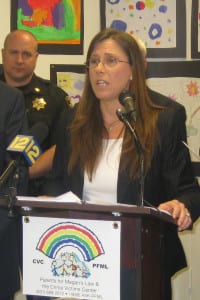By Elana Glowatz
Suffolk County is entering obscure territory this year as some sex offenders drop off the state registry and others have lost restrictions on where they can live.

It was exactly one year ago that the New York State Court of Appeals ruled that local laws restricting where sex offenders could live were invalid, following a lawsuit from a registered offender from Nassau County who challenged his own government’s rule that prohibited him from living within 1,000 feet from a school. Judge Eugene Pigott Jr. wrote in his decision that “a local government’s police power is not absolute” and is pre-empted by state law.
State regulations already prohibit certain sex offenders who are on parole or probation from living within 1,000 feet of a school or other child care facility, according to the New York State Division of Criminal Justice Services, but the local laws went further. In Suffolk County, Chapter 745 made it illegal for all registered sex offenders — not just those on parole or probation — to live within a quarter mile of schools, day care centers, playgrounds or their victims. But following Pigott’s decision, that law, while still technically on the books, is no longer enforceable.
To make matters more complicated, Jan. 1 marked the beginning of the end for some of the lowest level sex offenders on the state registry.
Offenders are grouped into one of three levels based on their perceived risk of committing another sex crime. On the lowest rung, Level 1 offenders who have not received special designations for being violent, being repeat offenders or having a “mental abnormality or personality disorder” that makes the person “likely to engage in predatory sexually violent offenses,” according to the Division of Criminal Justice Services, are only included on the registry for 20 years from their conviction. The New York State correction law enacting that system has just turned 20 years old, meaning the earliest offenders added to the registry are beginning to drop off.
The Sex Offender Registration Act obligates Level 2 and Level 3 offenders, as well as those with the additional designations, to remain on the registry for life, although there is a provision under which certain Level 2 offenders can appeal to be removed after a period of 30 years.
At a recent civic association meeting in Port Jefferson Station, Laura Ahearn from the advocacy group Parents for Megan’s Law — which raises awareness about sex crime issues and monitors offenders — gave examples of offenders set to come off the registry this year, including a man who raped a 4-year-old girl, and another who raped and sodomized a woman.
But it doesn’t stop there.
“It is thousands over time that are going to drop off,” Ahearn said.
A database search of Level 1 offenders along the North Shore of Suffolk County turned up many offenders who had been convicted of statutory rape or possession of child pornography, and who had served little to no time in jail. However, there were more serious offenses as well.
“You know when an adult man or an adult woman rapes a 4-year-old, that is just shocking. That [should be] a lifetime registration.”
— Laura Ahearn
Some of the undesignated Level 1 offenders who were convicted shortly after the Sex Offender Registration Act was created include a Smithtown man, now 43, convicted of first-degree sexual abuse against a 19-year-old; a 61-year-old Rocky Point man who sexually abused a 12-year-old girl more than once; a Huntington man, now 40, who sexually abused an 11-year-old; and a Rocky Point man convicted of incest with a 17-year-old.
Ahearn’s group has argued that sex offenders are more likely to reoffend as time goes on. According to Parents for Megan’s Law, recidivism rates are estimated to be 14 percent after five years and 27 percent after 20 years.
One midnight in January, Suffolk County police arrested a 48-year-old man, later discovered to be a registered Level 1 sex offender, in Fort Salonga after the suspect was allegedly caught undressed inside a vehicle with a 14-year-old boy. Police reported at the time that the two arranged the meeting over a cellphone application and there had been sexual contact.
The man had been convicted of sexual misconduct with a 16-year-old girl in 2003 and was sentenced to six years of probation. His new charges included criminal sex act and endangering the welfare of a child.
“So it makes no sense logically” to let Level 1 offenders drop off the registry after 20 years, Ahearn said in Port Jefferson Station. She has advocated for the terms to be extended or to have offenders appeal to be removed from the registry, like Level 2 offenders can after 30 years, so it can be decided on a case-by-case basis.
It’s a “you-know-it-when-you-see-it kind of thing, because you know when an adult man or an adult woman rapes a 4-year-old, that is just shocking,” she said. “That [should be] a lifetime registration.”
Even if the offenders remain on the registry, the court ruling that struck down restrictions on where most offenders can live has made matters trickier.
Ahearn said the fact that multiple layers of local government had enacted restrictions contributed to the situation.
“What happened is it got out of control,” she said.

Below the Suffolk County level, for example, the Town of Brookhaven had its own restrictions that prohibited offenders from living within a quarter mile of schools, playgrounds or parks.
There are bills floating around the state government that would tighten restrictions on where certain sex offenders could live, but the only one that has gained traction is a bill state Sen. Michael Venditto (R-Massapequa) sponsored, along with state Sen. John Flanagan (R-East Northport), that would return to local governments the power to regulate where offenders can reside.
“Local laws designed to protect children against registered sex offenders are enacted in response to unique conditions and concerns of specific communities and should act in complement with existing state law,” the bill’s summary read.
Although the bill passed the Senate last year, it died in the Assembly. But Venditto reintroduced his proposal this year.
For more information about sex offender laws or to search for sex offenders in a specific neighborhood, visit the New York State Division of Criminal Justice Services at www.criminaljustice.ny.gov or the Parents for Megan’s Law group at www.parentsformeganslaw.org.






